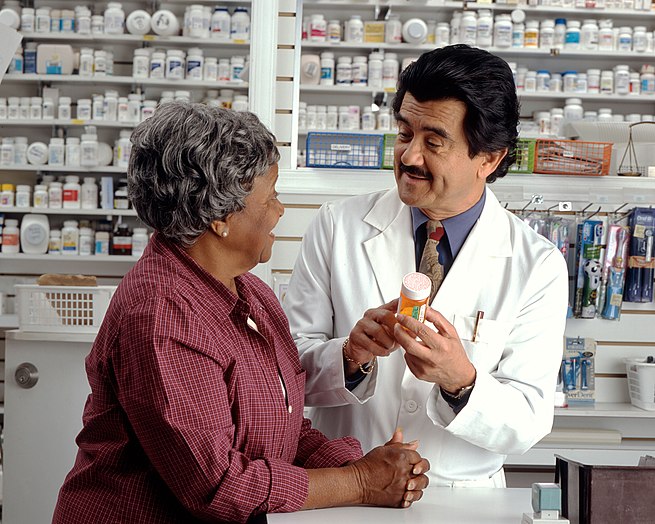
Main Difference
The main difference between Pharmacist and Apothecary is that the Pharmacist is a healthcare professional who practices in pharmacy and Apothecary is a historical name for a medical professional now called a pharmacist.
-
Pharmacist
Pharmacists, also known as chemists (Commonwealth English) or druggists (North American and, archaically, Commonwealth English), are health professionals who practice in pharmacy, the field of health sciences focusing on safe and effective medication use. A pharmacist is a member of the health care team directly involved with patient care. Pharmacists undergo university-level education to understand the biochemical mechanisms and actions of drugs, drug uses, therapeutic roles, side effects, potential drug interactions, and monitoring parameters. This is mated to anatomy, physiology, and pathophysiology. Pharmacists interpret and communicate this specialized knowledge to patients, physicians, and other health care providers.
Among other licensing requirements, different countries require pharmacists to hold either a Bachelor of Pharmacy, Master of Pharmacy, or Doctor of Pharmacy degree.
The most common pharmacist positions are that of a community pharmacist (also referred to as a retail pharmacist, first-line pharmacist or dispensing chemist), or a hospital pharmacist, where they instruct and counsel on the proper use and adverse effects of medically prescribed drugs and medicines. In most countries, the profession is subject to professional regulation. Depending on the legal scope of practice, pharmacists may contribute to prescribing (also referred to as “pharmacist prescriber”) and administering certain medications (e.g., immunizations) in some jurisdictions. Pharmacists may also practice in a variety of other settings, including industry, wholesaling, research, academia, military, and government.
-
Apothecary
Apothecary () is one term for a medical professional who formulates and dispenses materia medica to physicians, surgeons, and patients. The modern pharmacist (also colloquially referred to as a chemist in British English) has taken over this role. In some languages and regions, the word “apothecary” is still used to refer to a retail pharmacy or a pharmacist who owns one. Apothecaries’ investigation of herbal and chemical ingredients was a precursor to the modern sciences of chemistry and pharmacology.
In addition to dispensing herbs and medicine, the apothecary offered general medical advice and a range of services that are now performed by other specialist practitioners, such as surgeons and obstetricians. Apothecary shops sold ingredients and the medicines they prepared wholesale to other medical practitioners, as well as dispensing them to patients. In seventeenth century England, they also controlled the trade of tobacco which was imported as a medicine.
-
Pharmacist (noun)
A professional who dispenses prescription drugs in a hospital or retail pharmacy.
-
Pharmacist (noun)
One who studies pharmacy.
-
Apothecary (noun)
A person who makes and provides/sells drugs and/or medicines.
-
Apothecary (noun)
A drugstore or pharmacy.
-
Pharmacist (noun)
a person who is professionally qualified to prepare and dispense medicinal drugs.
-
Apothecary (noun)
a person who prepared and sold medicines and drugs.
